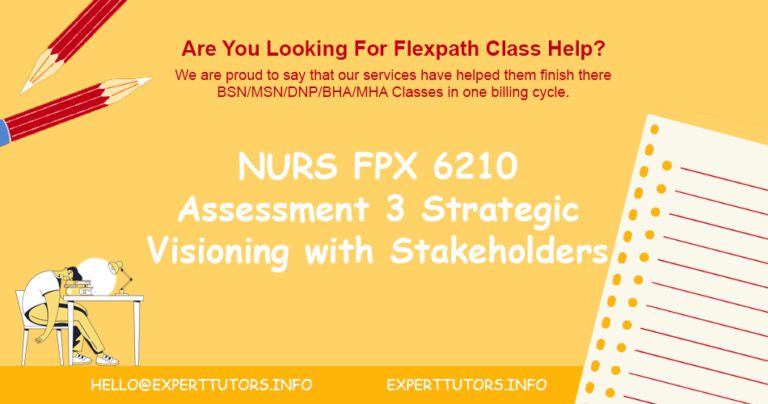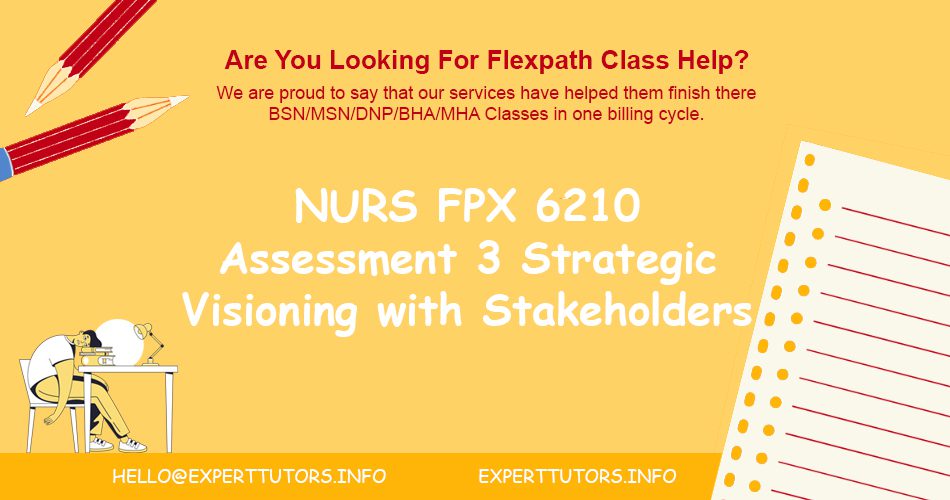Assessment 3: Strategic Visioning with Stakeholders
Name
Capella University
NURS-FPX 6210
Prof. Name
April, 2024
Strategic Visioning with Stakeholders
Slide 2
Hello, I’m ________, and today I’ll be discussing “Strategic Visioning with Stakeholders” at City Hospital. Hospital-acquired infections present significant challenges to healthcare systems globally, often resulting in extended stays, elevated treatment costs, and mortality. Our session will focus on the vital role of stakeholder collaboration in formulating a strategic approach to prevent these infections. We’ll explore how leveraging management competencies like critical thinking, problem-solving, and effective communication can forge robust strategies to tackle these issues. Together with stakeholders, we aim to forge a collective strategy that diminishes infection rates and enhances the quality of healthcare delivery.
Strategic Plan Summary
Slide 3
City Hospital is committed to addressing hospital-acquired infections (HAIs) through a detailed strategic plan that prioritizes their prevention. In the short term, the goal is to reduce HAIs by 20% within the next year, with a longer-term focus on implementing robust prevention measures. Strategies include continuous education and training for staff, engaging patients and their families in prevention efforts, and thorough monitoring and evaluation of infection control practices (Tangatarova & Gao, 2021). The strategic objectives align with the hospital’s mission to provide high-quality, patient-focused care. However, achieving these goals faces challenges, including resource limitations, staffing issues, and competing priorities in the healthcare environment. Overcoming these barriers is essential to enhance the effectiveness of City Hospital’s strategic initiatives.
Slide 4
Strategy for Communicating with Stakeholders & Constituencies
Effective communication plays a pivotal role in the successful deployment and upkeep of a strategic plan at a city hospital. It is crucial for hospitals to articulate their strategies clearly to all key stakeholders, such as staff, patients and their families, regulatory bodies, and community partners. To craft an impactful communication plan, hospitals must consider the cultural and ethical preferences that influence stakeholder communication preferences (Farrington et al., 2023). For instance, while some may favor direct, face-to-face interactions, others might opt for digital communications like emails. A hospital can utilize various communication mediums to disseminate its strategic plan, including staff briefings, patient and family engagement forums, newsletters, and digital updates via emails. Leveraging social media platforms or hospital websites can be effective in broadcasting strategic milestones and updates to a broader audience.
Slide 5
Necessary Actions
City Hospital faces several critical requirements to achieve its strategic goals, including necessary staff adjustments, resources, and a shared value system. Firstly, the hospital might need to evaluate and possibly restructure its organizational framework to align more closely with its strategic objectives, possibly by reorganizing teams or departments according to priority needs. Secondly, fostering a culture that emphasizes high-quality healthcare and safety is essential. This can be achieved by regularly communicating the hospital’s mission and vision to the staff and providing ongoing education and training to reinforce these values (Merriel et al., 2022). Thirdly, the hospital should offer continuous professional development to ensure that staff possess the skills and knowledge required for effective execution of strategic goals. This could include training in evidence-based practices for infection prevention and control. To measure the success of these implementations, the hospital could use evaluation metrics such as staff retention rates, feedback from employee satisfaction surveys, and comments from recent hires about their onboarding experience.
Slide 6
Implementation & Outcomes of a Strategic Plan
City Hospital can adopt several measures to assess the effectiveness of its strategic plan and compare it against established performance benchmarks. First, the hospital should define specific metrics to track progress towards its strategic goals, such as rates of hospital-acquired infections (HAIs) or patient satisfaction scores. Second, it’s essential for the hospital to regularly gather and analyze data related to these metrics. This might involve conducting regular audits or surveys to monitor the hospital’s advancement towards its strategic objectives (Togioka et al., 2022). For example, the World Health Organization’s PATH (Performance Assessment Tool for Hospitals) offers a thorough framework for evaluating hospital performance and supports strategic decision-making in hospital management. Finally, using this data effectively can pinpoint strengths and identify areas needing improvement. This ongoing evaluation allows the hospital to refine its strategies to better achieve its desired outcomes.
Slide 7
Areas of Uncertainty or Knowledge Gaps
In the hospital environment, various uncertainties and knowledge gaps can hinder the effective evaluation of strategic plan implementation and outcomes. One common issue is the limited availability of data for specific performance indicators, which can obstruct a clear assessment of progress. There might be challenges in accurately measuring the advancement towards strategic objectives, either due to inadequate data collection methods or the complexity of the metrics involved (Arundell et al., (2021).
Addressing these uncertainties involves several strategies. Enhancing data collection processes and investing in more sophisticated data analytics technologies can provide a more comprehensive and accurate data set. Training staff to effectively use these tools and understand the metrics can also bridge knowledge gaps (Armstrong et al., 2020). Establishing a feedback loop within the hospital can help identify and rectify issues more swiftly, ensuring continuous improvement in strategic plan evaluation. These efforts not only refine the evaluation process but also strengthen the overall strategic planning efforts of healthcare settings.
Slide 8
Relevant Cultural, Ethical, & Regulatory Considerations
Cultural, ethical, and regulatory factors play significant roles in shaping strategic plans within healthcare institutions. It’s essential to align interventions with the cultural values and beliefs of patients, families, and staff to ensure respect and effectiveness. Ethical considerations, such as patient autonomy, informed consent, and confidentiality, are crucial when formulating strategies for infection prevention and control (Stadler, 2021). Adherence to regulatory standards governing healthcare practices is necessary to ensure compliance with legal and policy frameworks. Conflicts may arise when cultural beliefs or values clash with medical recommendations or regulatory directives. In such instances, healthcare managers need to engage openly with patients and families to understand their viewpoints and strive for solutions that accommodate cultural sensitivities while upholding ethical standards and public health needs. This balanced approach ensures that decisions are ethically sound and respect patient autonomy.
Slide 9
Role as a Nursing Leader
A nurse manager is pivotal in the successful execution and ongoing adherence to strategic plans within a healthcare setting. Typically tasked with supervising patient care and ensuring staff compliance with evidence-based practices, a nurse manager ensures consistent implementation of infection prevention and control measures and oversees staff training and support. By embodying a commitment to patient safety and high-quality care, a nurse manager not only sets a professional standard for others but also fosters a culture of trust and safety throughout the hospital (AlKhamaiseh et al., 2020). Engaging actively with patients, families, and staff helps to build a supportive environment conducive to strategic goals. A nurse manager’s expertise is also crucial in guiding decision-making at higher organizational levels and advocating for the necessary resources to achieve strategic objectives. Underlying these efforts are assumptions that leadership is essential for quality and safety, that the nurse manager possesses the requisite skills for effective practice, and that the staff is open to change, supported by an organizational structure adequate for these initiatives.
Slide 10
Leadership Qualities & Skills to Implement a Strategic Plan
As a leader, the qualities and skills one possesses are crucial in guiding a team to execute strategic plans and sustain strategic direction. Strong communication and collaboration skills enable a leader to effectively convey messages, understand team concerns and ideas, and collaborate on developing robust strategies to meet organizational goals. Demonstrating integrity, accountability, and empathy in leadership not only builds trust with team members but also fosters a positive work environment that encourages teamwork and innovation. As a manager, recognizing the importance of personal growth is vital. No one is without flaws, and everyone has areas for improvement. Being receptive to feedback and actively seeking learning opportunities can significantly enhance a leader’s effectiveness, facilitating better guidance for the team towards achieving strategic objectives.
Slide 11
Conclusion
In conclusion, effective leadership in healthcare requires a combination of robust communication, collaborative skills, and a commitment to ethical practices. A nurse manager plays a critical role in steering the team towards achieving strategic objectives, particularly in areas such as infection control and patient safety. By embodying qualities such as integrity, accountability, and empathy, a leader can cultivate a trusting and supportive work environment that fosters innovation and teamwork. An openness to personal growth and continuous learning ensures that a leader remains effective and responsive to the evolving needs of their team and the broader organizational goals (Ottonello et al., 2023). Through such dedicated leadership, healthcare organizations can maintain a strategic direction that not only meets but exceeds the standards of care and operational efficiency.
Slide 12
References
AlKhamaiseh, Z., Abdul, Afthanorhan, A., & Alqahtani, A. H. (2020). Exploring and developing items measuring situational leadership II (SLII). Development, 3, D4.
https://doi.org/10.18510/hssr.2020.8266
Armstrong, A. J., Holmes, C. M., & Henning, D. (2020). A changing world, again. How Appreciative Inquiry can guide our growth. Social Sciences & Humanities Open, 2(1), 100038. https://doi.org/10.1016/j.ssaho.2020.100038
Arundell, F., Sheehan, A., & Peters, K. (2021). Developing and conducting appreciative inquiry interviews. Nurse Researcher, 29(4), 36–43. https://doi.org/10.7748/nr.2021.e1811
Farrington, N., Dantanus, K., Richardson, A., & Bridges, J. (2023). Understanding the cultural environment of the outpatient care setting for patients with dementia receiving cancer treatment: A qualitative study. Health Expectations, 26(1), 98–107. https://doi.org/10.1111/hex.13523
Merriel, A., Wilson, A., Decker, E., Hussein, J., Larkin, M., Barnard, K., O’Dair, M., Costello, A., Malata, A., & Coomarasamy, A. (2022). Systematic review and narrative synthesis of the impact of Appreciative Inquiry in healthcare. BMJ Open Quality, 11(2), e001911. https://doi.org/10.1136/bmjoq-2022-001911
Ottonello, G., Napolitano, F., Musio Maria, E., Catania, G., Zanini, M., Aleo, G., Timmins, F., Sasso, L., & Bagnasco, A. (2023). Fundamental care: An evolutionary concept analysis. Journal of Advanced Nursing, 79(6), 2070–2080. https://doi.org/10.1111/jan.15451
Stadler, A. (2021). The health insurance portability and accountability act and its impact on privacy and confidentiality in healthcare. Senior Honors Theses. 1084. Liberty University. https://digitalcommons.liberty.edu/honors/1084/
Rowe, A., & Knox, M. (2023). The impact of the healthcare environment on patient experience in the emergency department: A systematic review to understand the implications for Patient-Centered Design. HERD, 16(2), 310–329. https://doi.org/10.1177/19375867221137097
Tangatarova, S., & Gao, Y. (2021). Transformational leadership and patient safety in hospital. International Journal of Research in Business and Social Science (2147- 4478), 10(2), 106–122. https://doi.org/10.20525/ijrbs.v10i2.1084
Togioka, B. M., Duvivier, D., & Young, E. (2022). Diversity and discrimination in healthcare. PubMed; StatPearls Publishing. https://www.ncbi.nlm.nih.gov/books/NBK568721/




